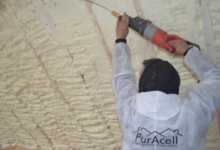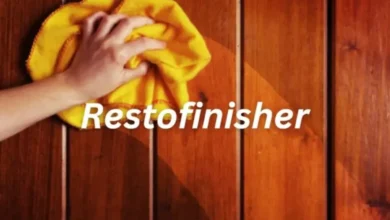Spray Foam Insulation in Timber-Framed Roofs

New reports have raised concerns about how spray foam insulation should be
used – especially on roofs made of wood.
Homeowners in England have had trouble getting mortgages or selling their homes because spray foam insulation was not installed correctly.
Spray foam insulation is a flexible insulation solution. It’s made of polyurethane, which is made from polyols and diisocyanates. It can be used on building floors, walls, roofs, and other parts.
Importance of Proper Installation
Spray foam insulation works best and is safest when it is installed correctly by a trained professional who follows the manufacturer’s instructions.
Failure to do so is counterproductive.
Potential Problems with Spray Foam Insulation
Improper installation can decrease air circulation in the roof space.
This can lead to dampness and condensation. That may damage the roof structure.
Poorly installed spray foam can cause decay in timber roof beams and other structural components.
Plus, if you don’t do it right the first time, removal can be expensive.
These problems show how important it is to choose a reputable company to install spray foam insulation.
Guidance for Homeowners
Homeowners should keep detailed records of how their spray foam insulation was installed. This means keeping:
spray foam guarantees
independent validation certificates from KIWA
British Board of Agrément (BBA)
surveys done before the installation
These papers may be very important for selling or refinancing the property in the future.
Spray Foam Insulation Mortgage Considerations
Although spray foam insulation is commonly used in timber-framed roofs, it has caused some homeowners trouble getting loans.
The choice usually depends on what kind of insulation is used and how well it was put in.
Before deciding to lend money, lenders usually want a professional survey to look at the insulation.
Addressing Spray Foam Issues
People who own homes should be wary of companies that pretend to be surveyors but lie about spray foam installations being non-compliant.
These companies usually recommend unnecessary removal of the insulation.
Isothane advises against removing correctly installed spray foam. They are working to report fraudulent companies to Trading Standards.
If a company like this calls, homeowners should first talk to the person who installed their system in the first place.
Some dispute resolution options are available for people who installed spray foam insulation with the help of the Green Homes Grant. Homeowners who sense deception or omission of information by their installer can seek compensation under the Consumer Protection from Unfair Trading Regulations 2008.
For trader disputes, it is best to talk to a lawyer and get help from Citizens Advice.
Expert Insights
The Home Owners Alliance (HOA) advises that surveyors should inspect the roof’s exterior condition due to the internal structure being covered by spray foam.
In March 2023, the Property Care Association (PCA) released a spray foam inspection protocol to help with this. This protocol tells surveyors how to look for risks inside pitched roofs. The PCA also provides training to help surveyors look at spray foam applications and suggest what should be done if problems are found.
The National Insulation Association (NIA) says that the design and installation of spray foam insulation should follow the latest building codes and rules.
To avoid problems or risks, homeowners should only hire licensed and certified contractors who know how to use spray foam.
Isothane too advises homeowners to do research and choose spray foam installers who are licensed and have experience. In this way, the installation is guaranteed to add value to the property and not detract from it.
Isothane develops and manufactures polyurethane foam technology for insulation, waterproofing, and various industrial applications. Their products include injected foam insulation for cavity walls and spray foam insulation for roofs.





